KYAN-AERO SOLO SURF (SMR-1000R, Prod.2038)
Sports floatplane
Rank: II
USER MANUAL
CONTROLS
Controls are included in the Craft Instructions.
VTOL - Flaps (note 1) (note 2)
AG1 - Navigation Lights
AG2 - Beacon Lights
AG3 - Strobe Lights
AG4 - Landing Lights
Note:
1. The flaps lever in the cockpit has priority. If the flaps lever is lowered by any amount, the VTOL input is ignored.
2. The extension angle is also limited by current airspeed. See Flaps Protection.
INSTRUMENT PANEL
Flaps
The flaps have three levels of extension (12, 25, and 50 degrees), plus a fully retracted position. Four colored lights show the extension level that is selected.
Flaps Protection
This system prevents the flaps from being extended above certain airspeeds. It will delay the extension of flaps until the speed is decreased. Flaps will also automatically retract above the specified airspeeds. The speeds for each flap position are as follows:
- Flaps 12: 240 kts (445 km/h)
- Flaps 25: 200 kts (370 km/h)
- Flaps 50: 160 kts (296 km/h)
Radar Altimeter
The radar altitude readout helps with smoother landings. It is calibrated to show an altitude of zero feet at the point where the aircraft touches the water.
Stopwatch
The digital stopwatch can be used for racing or dead reckoning. Push the "Run" button to start the timer, and push it again to pause it. Push the "Reset" button to restart the timer from zero.
WATER HANDLING
- No sharp turns above 100 knots (185 km/h)
- Be careful of spinning if turning with the aid of differential thrust.

DEV COMMENTS
Weird seaplane for the Seaplane Challenge. It was originally designed for a different challenge but I wasn't feeling it too much.
Original sketch
The aircraft is inspired by a what-if scenario - what if seaplanes for island defense really took off? Speed aside, this plane has fighter performance. Try to hit ring 16 on Shark Tooth, I got a 3:07 ))))))
There is a lot of influence from real life aircraft. The rectangular air intakes are based on the Jaguar, but are not connected to the high wings. The engine and empennage arrangement is based on the F-4. The tail is more modern and based on private jets. The design is quite practical other than the fact that you have high drag pontoons on a high speed airplane.
The cockpit is all about visibility, and seeing the ground below you. I experimented more with labels to build flight instruments. Some of which don't use gauge faces at all. I used some previous knowledge from messing about with Processing.
Overall, a nice dive into the sports general aviation category.
40 hours later post: no one has found the hidden "comment [ ___ ] if you read this" message yet bruh

Cursed image (i'm making another character drawing based on this plane, maybe i'll add it here when i'm done)
INFORMATION
The first-generation SOLO SURF, model SMR-1000, is a sports seaplane built by Kyan Aerospace Company (KYAN-AERO).


Specifications (SMR-1000R Prod.2038)
Relevant flight tests at 25,000 ft
Crew: 1
Length: 9.72 m
Wingspan: 7.98 m
Height: 4.03 m
Empty weight: 2,600 kg
Gross weight: 3,300 kg
Powerplant: 2x low bypass turbofan engine
Maximum speed (TAS): 387 kts (717 km/h)
Range (100% thrust): 262 nmi (485 km)
Speed limit (IAS): 380 kts (704 km/h)
Speed limit (Mach): 0.78
Rated G-load: +7.5/-2.2 G
Avionics (SMR-1000R Prod.2038)
"GAMING GT1000" flight display and air data computer
VHF communication system
ADF and VOR radio navigation system
GPS (optional)
Production (SMR-1000, all variants)
Developer: Kyan Aerospace Company
Manufacturer: Kyan Aerospace Company
Units Built: 1411
Unit Cost: from $600,000 (SMR-1000R)
KYAN-AERO was founded by five former employees of a well-known jet aircraft manufacturer. Using their experience, they designed their first concept aircraft, a jet-powered seaplane with floats blended into the wing. The prototype was displayed at a Southeast Asian air show and, while a static display and unable to fly, it succeeded in getting attention from the industry. KYAN-AERO received the funding needed to start a small aircraft manufacturing plant, and "promised" to build a jet seaplane.
In the years of research and development that followed, KYAN-AERO substantially toned down the design of the aircraft to a more conventional configuration. Floats were mounted on pylons under the fuselage, and the wings were now top-mounted. However, other features like the fighter-style engine placement and the cockpit nose cone were kept.
The machine was dubbed the SOLO SURF and its serial production began in 2038. Two variants were produced - a standard model with less thrust, and a sportier "R" variant with over 50% more thrust. Other options offered include GPS, autopilot, the use of cabin pressurization or a mask-based oxygen supply, and even an in-flight refueling probe.

The SOLO SURF received generally positive reviews. Outside of purpose-built aerobatic planes, it was one of the most maneuverable civilian sports aircraft of its time. The Skill Issue praised the machine's exceptional performance while still maintaining "an ease of handling suitable for sightseeing." However, criticism was directed at its impracticality, noting the difficulty in obtaining jet fuel at seaplane ports, and getting in and out of the plane.
The SOLO SURF received numerous revisions and variants until production of the airframe ceased in 2065.
Specifications
Spotlights
- This craft is curated
- jamesPLANESii 3.7 years ago
General Characteristics
- Predecessor Seaplane Challenge
- Successors 5 airplane(s) +14 bonus
- Created On Windows
- Wingspan 26.2ft (8.0m)
- Length 31.9ft (9.7m)
- Height 13.2ft (4.0m)
- Empty Weight 10,243lbs (4,646kg)
- Loaded Weight 12,052lbs (5,466kg)
Performance
- Power/Weight Ratio 3.915
- Wing Loading 61.6lbs/ft2 (300.6kg/m2)
- Wing Area 195.8ft2 (18.2m2)
- Drag Points 1601
Parts
- Number of Parts 455
- Control Surfaces 3
- Performance Cost 1,887

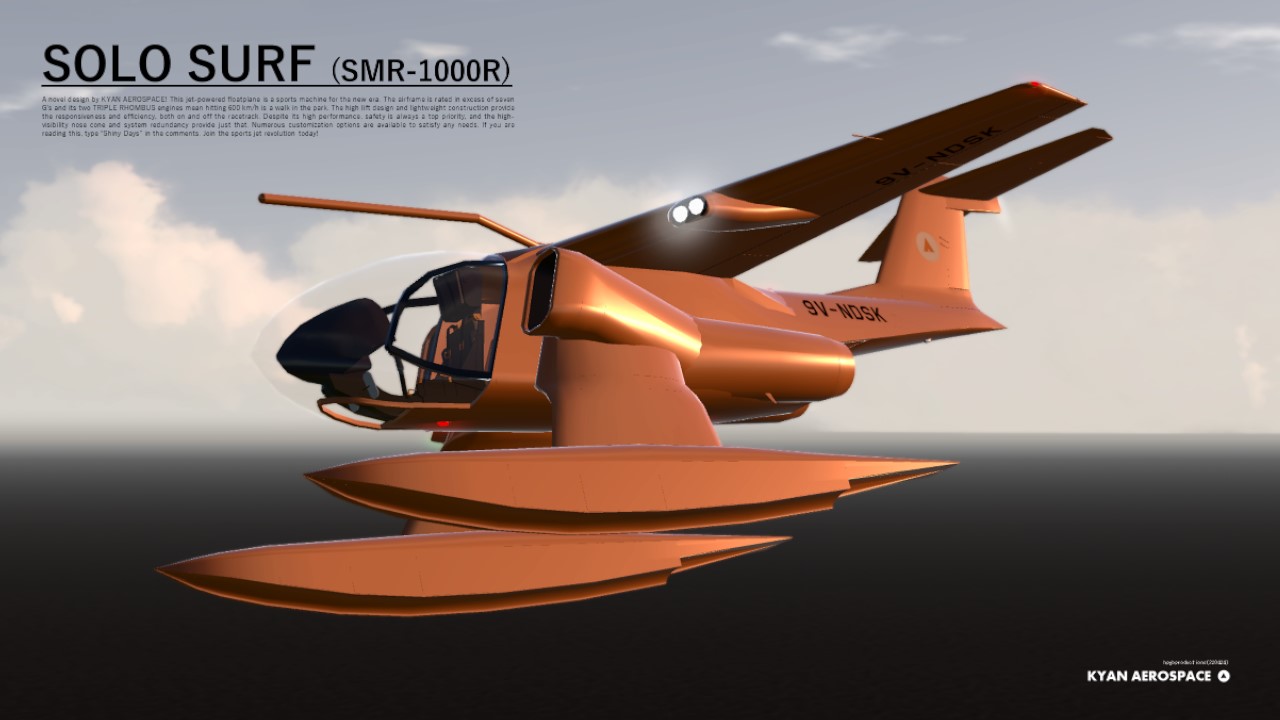
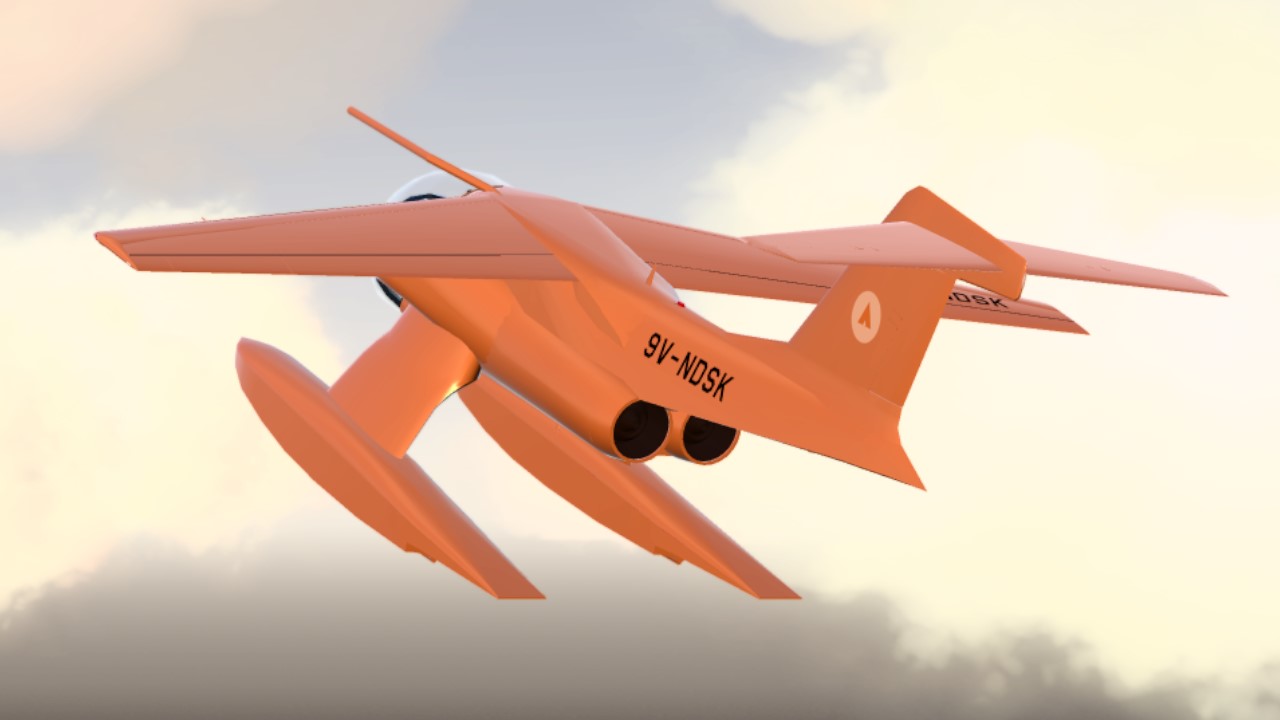
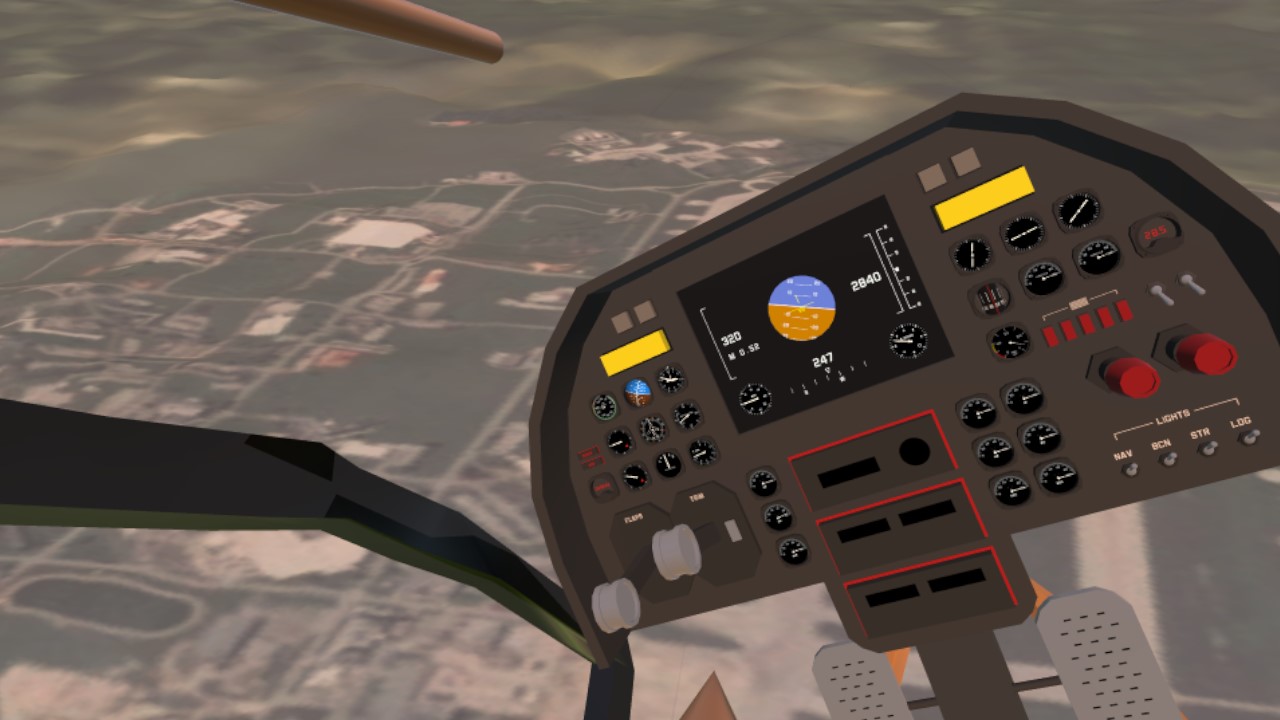


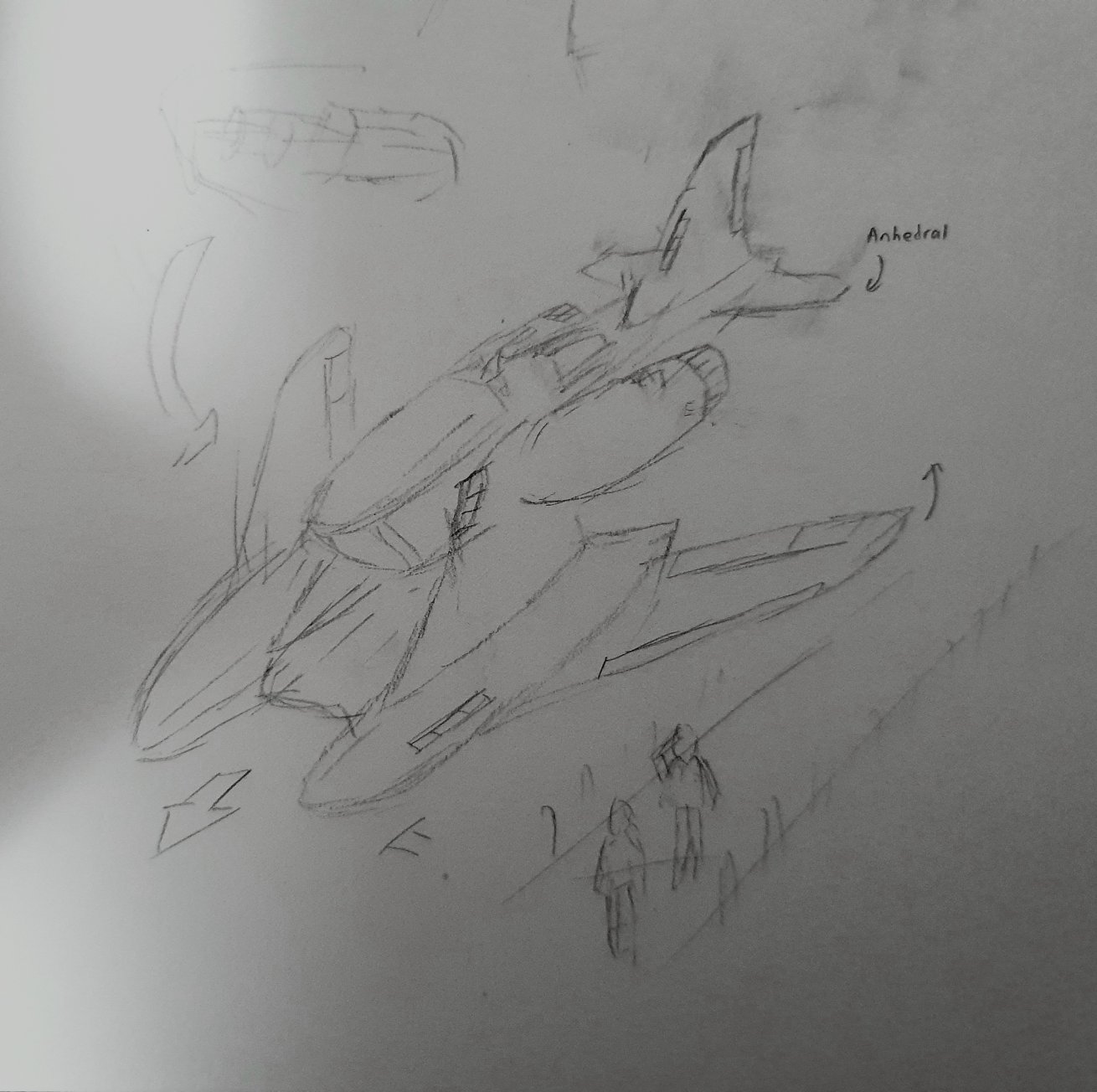
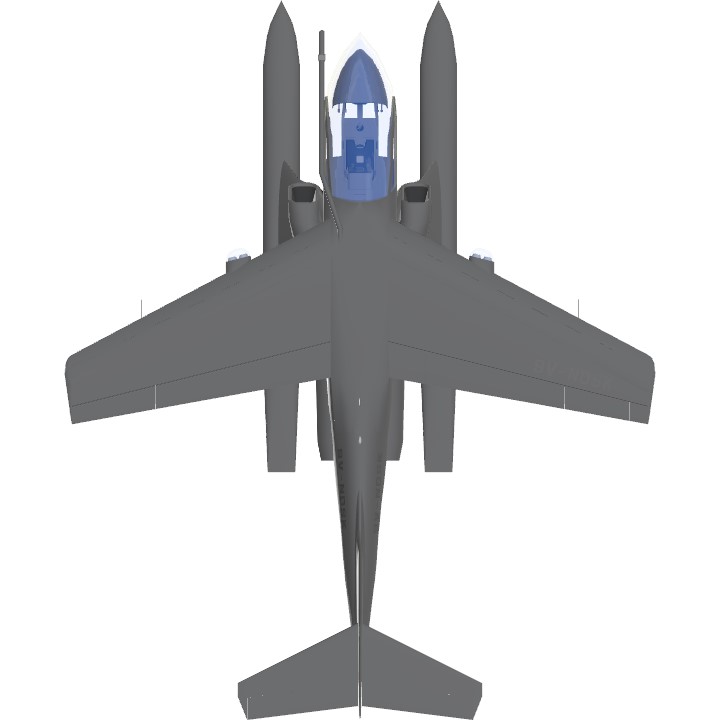
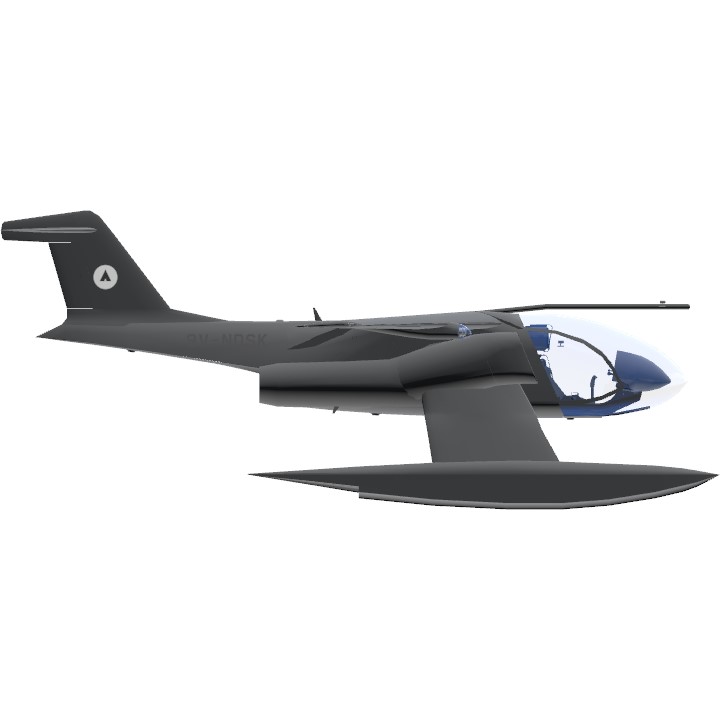
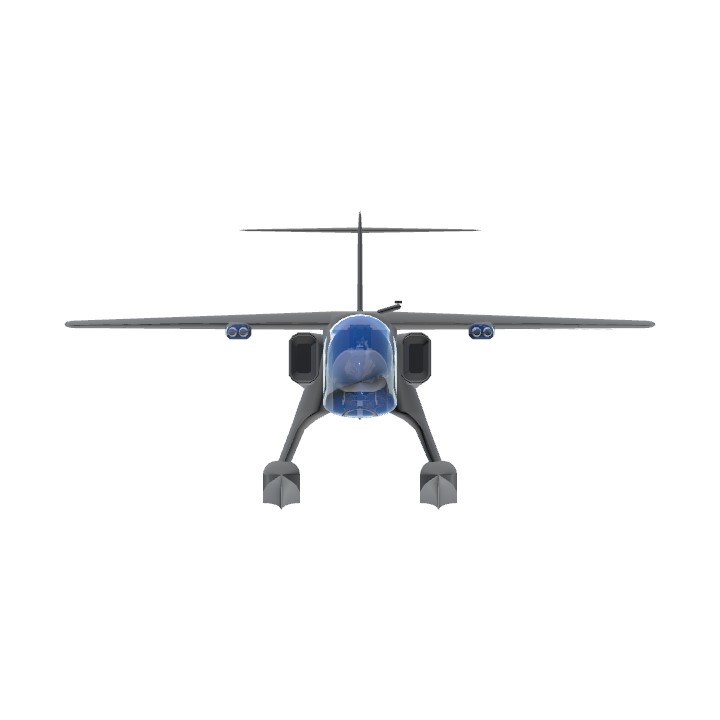
cursed image 2
cursed image 3 (summer festival ver.)
.
curated means can't hide more awful jokes in the desc smh
Sorry... Just sorry... I created a military🪖 and nuclear☢️ war purpose variants of this plane. Again sorry.
@hpgbproductions thank you so much! Thats a lot of info, I will definitely read it bacm and see what I can make tomorrow. Right now I'm trying to make an automatic approach for the USS Beast haha its very consuming and the geometry is hard
Btw this plane is super cool I love the cockpit cam
@UltraLight here are some techniques. Try to add FT one line at a time to see how it works, since that is how I write them anyway
.
Digital instrument tape
Found in artificial horizon and heading indicator.
You can make a long tape using equally spaced
-or|characters with numbers, and usespaceorline-heightbefore the first item to move the tape. But long tapes will extend out of the gauge or aircraft.You can make a seamless transition by using a shorter tape if you use the
repeatfunction in your tape offset.Change the numbers using FT. Look at the artificial horizon to see how you can do it.
.
Variable-length shapes
You can nudge one character (e.g. full square) into another to blend between the length of 1 and 2 squares. Use
spaceorline-heightdepending on the direction of variable length.Remember that characters later in the label text render above earlier ones. You can use it to have colored bands of different heights.
.
Two-way rectangle meter
Extension of the rectangle meters used on the stock planes. On a center aligned label, add two of those meters, one after the other. Use
abson the input to ensure both are the same length and hence centered. Usealphato select only one of the bar meters as needed..
Prepend zeroes
Uses two
{ }substitution sections. The second section is the input number as usual. The first checks if the input number will occupy the tens, hundreds, etc. spaces, and adds the desired number of zeroes.Could you explain how you did the labels on the main panel please? I'm pretty advanced with ft and I'm doing a lot of reading into formatting for the new labels but idk how you're doing all that.
@hpgbproductions I Love The PFD, Great Job Bro.
Nice
Shiny Days
That was such a good challenge, a ton of real nice designs from it.
Including yours!
@goboygo1 oh no, i have been found out
Very neat design! I really like the concept sketch, I assume it was for the pedestal fighter challenge originally.
outstanding work, I love the concept sketch too.
It looks really nice in white! I love the cockpit as well
@hpgbproductions
thanks, but I already decided to stay on the current version.
@DerVito yes, but be careful that in some cases, the text on the numbering label disappears. Probably some rendering quirks
When the instrument panel is pitched down 10 degrees like in this plane, that doesn't ever seem to happen. But in a flat instrument panel, the text disappears every time you fly inverted
YESSSSSSSSS SO GOOD
epic people always make epic planes
ayo this is epic